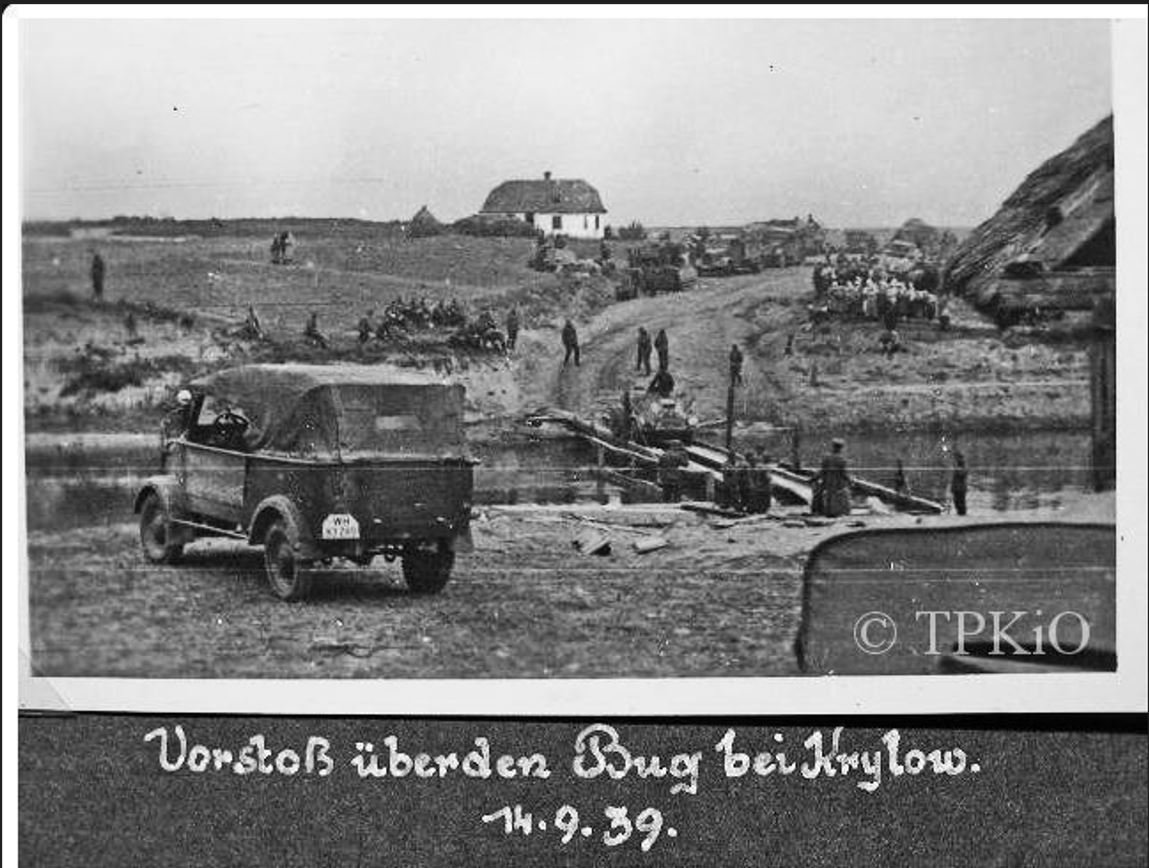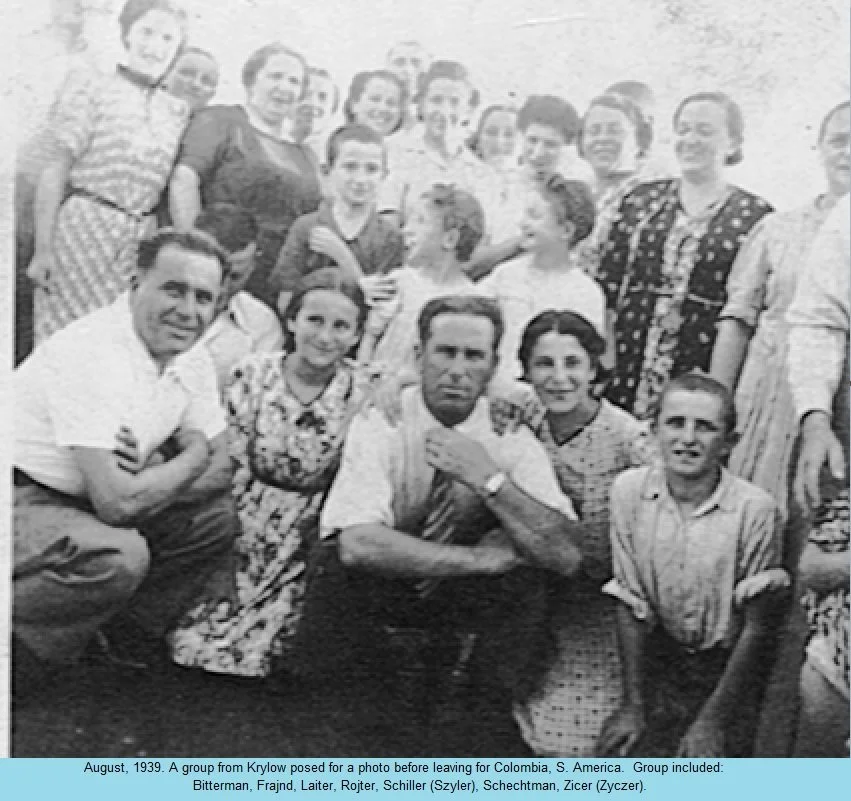Memories of Jewish Kryłów
No Yizkor book exists for the community of Kryłów (Krylow) in eastern Poland, near Hrubieszow. On this page, we have put together some memories of Krylow from the Jewish families that formerly lived there. Krylow formerly had around 1,000 Jews, and only around 25 of them survived the Holocaust. Yet their stories and memories must be heard, and remembered.
Please also visit Remember Jewish Kryłów. And please contact us if you have additional information to add.
Yizkor Index - see
below for articles:
Jews of Krylow move to Colombia a few days prior to start of Holocaust (April 2013)
Remembering the Goldapel Family by David Lejfer (Dec. 2022)
Remembering Moshe Bitterman by Aaron Biterman (April 22, 2015)
Remembering the Adamczuk Rabbinic Family (2022)
Remembering the Rokeach Rabbinic Family (Dec. 7, 2011)
Jews of Krylow move to Colombia a few days prior to start of Holocaust
My name is Leon Fleisman. My mother was Bella Zicer (Zycer) and she was born in Krylow in 1920. Two months before the war, she and the family (including 6 siblings) as well as 20 other families from Krylow traveled to Colombia, South America to live.
The group participants were able to obtain a visa from the Colombian consul in Poland, with the intent to become agriculturals accessors (cultivating potatoes). Some of the surnames of the families who left for Colombia from Krylow, Poland in August of 1939 included:
Bitterman
Fraind / Frajnd
Laiter / Lejter
Roiter / Rojter
Szechtman
Szyler/Sziler
Zycer
The Zycer family left by boat from Gdansk, Poland to Le Havre, France, and then to Barranquilla, Colombia. From Barranquilla, they all take boat to Puerto Berrio, Colombia, and then a train to Medellin, Colombia. From Medellin, they took a bus to La Union, Colombia (State of Antioquia), and began to cultivate potatoes. After a few years, the entire family settled in Medellin, Colombia. Today, this family has more than 80 members — who reside in Bogota, the United States, and Israel.
source: The late Leon Fleischman, and his nephew Michael Patino, from the Zycer family
Remembering the Goldapel Family by David Lejfer (Dec. 2022)
Erez, our oldest grandchild, a junior in high school, has a driver's permit and is ready to conquer the world. Mila, our youngest grandchild, a one-year-old, moved from an observer in her highchair to a walking explorer.
When Germany invaded Poland in 1939, life for the Goldapel family turned the hardships and the simple joys of daily living into a journey for survival. David, my maternal grandfather, 48, wife, Helen, aka Buba, 38, daughters Genia, 17, Mania, 15, and Bella, 8, moved from a small shtetl of Krylow, Poland to Volodymyr-Volynsky, Ukraine, occupied by the Russians, to delay the inevitable.
"Who shall live, and who shall die?" On June 21, 1941, the Germans marched into town. Separated to avoid suspicion, the family frequently moved amongst barns, haystacks, and the homes of my grandfather's courageous and sympathetic non-Jewish friends to avoid capture and incarceration in one of two sections of the ghetto. According to my aunt Genia, Jews named the first "Life," which housed those who could do manual labor or with special skills. The second "Death," because children, the elderly, the sick, and the weak were destined for immediate liquidation.
On Thursday, November 12, 1942, thinking it was "safe" to enter the ghetto, David and his family entered. Tired, hungry, and filthy, David gathered his wife and daughters to replace their soiled, tattered clothes with the garments of murdered Jews, eat a few spoonfuls of watery potato soup, and rest.
This was the same day the second Aktion (pogrom) started in Vladimir Volynsky**. Two thousand five hundred Jews were murdered, including my grandfather.
Sixty-four years later, on November 18, 2006, speaking in a calm and deliberate voice, my mother, Mania, in an interview with my cousin Charlie Rosenberg, describes witnessing her father's death, escaping from the ghetto, and descending into the next level of hell.
For three weeks, Mania hid in a four-by-four-foot underground root cellar. Only late at night, she felt "safe" to remove the cover, stand, and painfully stretch her legs. What did a 17-year-old think about in her crypt? Did she relive the nightmares or dare to dream of surviving, marrying, and having children and grandchildren?
Only when her oldest grandchild, Mara, for a High School class project, started asking about her experience during the Holocaust did a few memories seep through the suppressed shadowy recesses of her brain. As my mother got older and more survivors died, she decided silence was not what the world needed. Mania instructed her three sons to never forget and teach our children and grandchildren about the Holocaust.
Tomorrow night is the first night of Chanukah. My mother and father will shed a few tears of joy as they watch their eight grandchildren and twelve great-grandchildren light the first candle.
** Dates and statistics about the Volodymyr-Volynsky Ghetto are from the book Jewish Ludmir, The History and Tragedy of the Jewish Community of Volodymyr-Volynsky, written by Volodymyr Muzychenko. The author Volodymyr lives in Volodymyr-Volynsky, Ukraine, and "takes care of the town's Jewish graves and sites of execution.”
Remembering Moshe Bitterman by Aaron Biterman (April 22, 2015)
Today is Yom Ha'atzmaut, Israel Independence Day.
Without the men and women of the Israel Defense Forces, there would be no Israel today.
One of our cousins, Moshe Bitterman, was killed in an elite brigade within the Israel Defense Forces during the Yom Kippur War.
Moshe was killed in battle on Oct. 8, 1973 at the young age of 19.
Thanks for your service. Zichrono le-vracha — may his neshama have an aliyah
Remembering the Rabbinic family Adamczuk (Adamszak)
In 1896, the rabbi who officiated the wedding of my great-grandparents in Krylow was Moshe Adamshik. The surname is spelled a variety of ways, including Adamczuk, Adamszak, Adamshik, and others too.
The marriage certificate states: It occurred in Krylow on Aug. 16, 1896 at 6pm. 57 year old Mordko Biterman (a cousin, not the father of the groom) and 35 year old Chaskiel Gran came to announce the marriage of Joseph Gershon Biterman, aged 23, born in Hrubieszow, son of Moszko and Marya [nee Adler] and Sura Gela Golomb, aged 21, daughter of Idel + Chawa [nee Kiper].
Rabbi Moshko Adamszek (Adamczuk)* performed the ceremony.
Rabbi Moyshe Hacohen Adamchyk, the Rabbi of Krilow, who was originally from Maciow, Wolyn district (Ukraine), occupied the position of trustee to the religious community of Chelm for several decades. As an objective judge, he would not deviate one iota from the "Shulkhan Arukh" (Jewish religious law). He was the oldest Rabbi in town. He was known in the entire rabbinical world as a great Talmudic scholar and an honest man.
One of his sons published the well-known book "Gan Ruva", a commentary on "Pri Mgadim". In the book one will find an interesting introduction of his father, the Rabbi of Krilow. The Krilower Rabbi passed away in the first year of the German occupation (1939). Afler many long efforts, the Nazi authorities gave permission to bury him in a Jewish cemetery.
Not much is known about this family, but: Judka Lejb HaCohen Adamschik (Adamshik), one of his sons, was a rabbi in Tyszowce and also was a Holocaust victim. Both descend from Yehuda Leib HaKohen, also a rabbi who served in Tyszowce.
May G-d avenge the souls of the family Adamczuk, a righteous family who served G-d, their families and their communities.
Remembering the Rabbinic family Rokeach by Miriam Rokeach (Dec. 11, 2011)
My name is Miriam Rokeach. My father was Milton Rokeach. He was born in Hrubieszow in 1918 and moved with his family to NYC in 1924. His father (my grandfather) was Leib Rokeach, a rabbi in the nearby town of Krylow. While in Hrubieszow, the family lived under the pseudonym Stern of Sztern (or similar to that using Russian alphabet). This is because his father, Ephraim Zalman Rokeach, who had also been Rabbi in Hrubiescow, had to escape to Austria-Hungary to hide from the Kossaks. They were looking for him (and not in a good way) because he was a leader of the community. When he returned to Hrubieszow, the family lived under the name Stern. This continued until my grandfather came to the U.S. and thought it would be safe to return to Rokeach.


